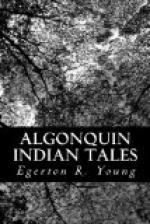But here the sound of the barking of the dogs, and the sweet tones of the silvery bells on the collars of the dogs that had come for the children, told that the two hours had passed away.
“Thank you ever so much,” said the grateful Minnehaha, as she rose to have loving hands carefully wrap her up for the return ride, “for that sweet, sweet story. It was so good of Nanahboozhoo to tell them about the sap in the maple trees, even if it is only there in the spring time.”
“I think old Nokomis deserves a good deal of the credit,” said Sagastao. “It seems to me that Nanahboozhoo would not have done it if she had not made him.”
“Well, Nanahboozhoo did it, anyway, and so we and the Indians have our maple sugar and molasses, and I am glad. And so, hurrah for Nanahboozhoo!” Thus replied Minnehaha.
Here Souwanas lifted the well-wrapped-up child, and carried her out to the cariole, where she and her brother were speedily covered and tucked in among the warm robes.
“Marche! Marche!” was shouted to the dogs by the driver, and away they sped over the icy trail with such speed that it was not long ere they were again safe and happy in their own cozy home.
CHAPTER XI.
Mary Relates the Legend of the Origin of Disease—The Queer Councils Held by the Animals Against Their Common Enemy, Man.
“Mary, how is it that I get sick sometimes,” said Sagastao the following summer, “and have to take medicine that I dislike? Why can’t we always be well?”
For the last week or ten days Mary had been most devoted and faithful in watchful care over her restless charge, who had been very sick but was now rapidly recovering.
“As soon as you are a little stronger I will tell you the legends of sickness and medicine, as handed down by our Indian forefathers,” said Mary, “but now you must only rest, and eat, and sleep.”
“Well, Sakehow” (beloved), his pet name for his faithful nurse, “I will try and mind you; don’t forget.”
The next week was one of rapid recovery, and very proud, indeed, was Mary when she led forth the two children, in the bright sunshine of a delightful summer day, to a cozy resting place among the rocks where the waves of Lake Winnipeg rippled on the sandy beach at their feet.
Minnehaha was eager for a story about the sweet birdies or the brilliant flowers, but the young invalid had his way this time, and Mary proceeded to tell the story of the Indians’ idea as to the origin of sickness and disease.
“Long, long ago,” said Mary, “all the animals and birds on this earth lived in peace and harmony with the human family. Then there was food for all in abundance without any shedding of blood. Even the wild animals, that now live by killing and devouring each other, found plenty of food in the fruits and vegetables that then were so abundant.




